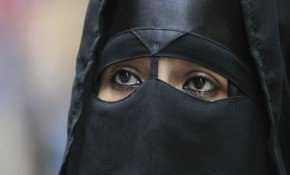In recent years there has been a movement across Europe to ban the Islamic ‘veil’ (a concept used variously to refer to the hijab, niqab or burqa) in public places.
The justification for the ban offered by governments is often couched in the language of the Enlightenment – particularly freedom and dignity for women. President Sarkozy contends that the burqa demeans and degrades women in a country whose commitment to women’s freedoms is sacrosanct.
Such impulses have a long history in France, and were highlighted by the 1989 foulard affair when three schoolgirls were expelled for wearing headscarves. But until now it was largely restricted to this country with its isolationist Republican history. Now, Italy, the Netherlands and Belgium have joined the movement to outlaw the wearing of certain garments worn by observant Muslim women. Whereas banning the veil in schools was presented as enforcing a general ban on religious symbols in public buildings, a general ban is couched in the language of human (and especially female) rights.
Such pronouncements can still be construed as politically motivated hubris. It is not a co-incidence that controversies about the hijab and burqa in France have coincided repeatedly with parliamentary or presidential elections, particularly as the National Front becomes a major first-round challenger. Vested political interests cannot be disentangled from Sarkozy’s concerns for women.
Silvana Koch-Mehrin, a member of the European Parliament, recently characterised the burqa as a ‘mobile prison’ and advocated a European-wide ban. Such populist appeals invariably draws in a general public, primed by extensive media coverage of the rise of radical Islam.
The political show helps explain the disproportionality of measures being pushed through the legislatures of the various European governments. Such deployment of the law hardly seems justified by the very small numbers of Muslim women who wear, in particular, the burqa in these countries. Estimates of women wearing the burqa in France range between 350 and 2000; in the Netherlands, between 50 and 100.
The disproportionate response to a minor social phenomena calls for a deeper analysis. An immediate cause is, of course, political posturing. However, the movement to ban Islamic clothing speaks to much deeper and wider trends.
Despite the series of terror attacks in New York, Madrid and London, there is a discernible trend among second and third generation Muslims towards a politics of engagement, one that hinges importantly on the mobilization of human rights arguments. Protests against the bans are, like official arguments in favour, often couched in the framework of European human rights – namely, the right to freedom of religious expression.
This new form of political activism, not found among first generation Muslims, has led to Muslims turning increasingly to the European Court of Human Rights (ECtHR) for protection of their rights, with France being a predominant target.
Human rights activism among this cohort has been celebrated as a manifestation of post-national citizenship, that is, a mature form of citizenship that sits above national rights and duties and is particularly powerful in the new, supra-national global context.
However, this progress has been stymied by the very institutions supposed to be critical to the institutionalization of post-national rights. To date the ECtHR has, through the margin of appreciation principle, deferred to national governments over the bans, thus relinquishing the chance to establish a European-wide principle over an increasingly contentious matter. Judgements have routinely accepted the view of the defending governments that the hijab (which has been the focus of the majority of cases) has proselytizing potential, necessarily oppresses women and restricts their autonomy despite petitions from women who have demonstrably chosen to wear it.
These decisions highlight an unwillingness to dig below the superficial reasons presented by national governments, on the greater good of secularism. They reflect a political and legal elevation of secularism, to the status of an absolute value which can actually infringe individual human rights in the process of protecting them collectively. Western governments have paid heavily for this adherence in the context of the Arab Spring. Dictatorships they supported for years – on the pretext of defending secularism – have failed their majority of moderate Muslim citizens, economically and politically.
The Court’s failure to establish a supra-national principle on this reflects, moreover, a wider dissociation: namely that between the secular nature of human rights and religion. Religious rights, which seem to be based on prescription, sit uneasily with secular human rights based on the notion of freedom. Until this paradox is resolved, Europe’s Muslims are going to find themselves caught up in a cul-de-sac which sees them at the vanguard of progressive politics being lagged by governments whose progressiveness provides its own brand of oppression of women. In the streets, attacks on women who choose to wear the hijab or burqa are growing as the offenders can comfort themselves with the belief that they are in tune with their governments.
The irony is that such bans constitute part of a wider trend towards immobilization and encampment of Muslims – epitomised by Guantanamo/Abu Ghraib – that has operated in parallel with greater openness associated with globalism. For pious women living in secular contexts the hijab and the burqa enable them to enter the public sphere – where citizenship rights are played out. Denying them this right confines them to the private sphere leading to greater restrictions on their freedom of movement and thus narrowing their lived citizenship.
The impulse for western governments, steeped in old power, to micro manage the behaviour of small minorities of women reveals more about their insecurity than their concern with women’s rights as the global power balance shifts inexorably from the old colonial powers to the emerging economies. Appeals to old colonial manifestations of power – including the governance of dress of their subjects – suggest a last gasp of declining authority.
Thus, what we are seeing is a growing trend among Europe’s Muslims to mobilize around the human rights whose original proclaimers still believe there is an inherent incompatibility between Islam and human rights. The original proponents, who invented these concepts (and associated powers) in the Napoleonic era and re-invented them during the Cold War, have become the main transgressors on this particular matter. Belying their Enlightenment pretexts, burqa bans betray vested domestic political interests and a decline of status which has created fertile territory for nostalgic appeals to a selectively presented colonial past.








